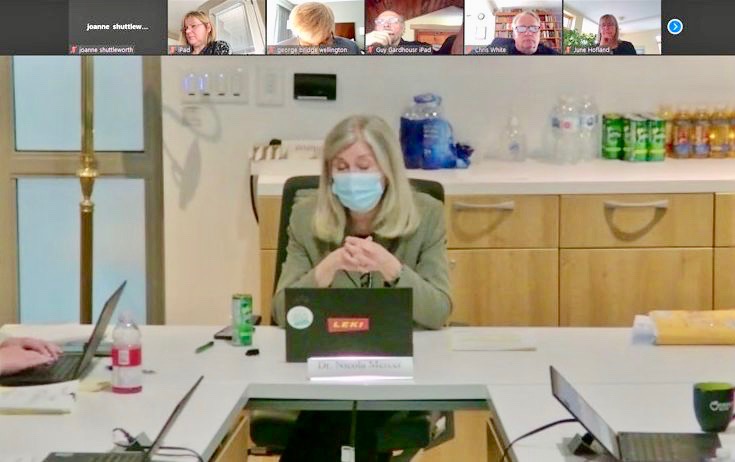GUELPH – When COVID-19 vaccines became available in Wellington, Dufferin and Guelph in early 2021, public health had the enormous task of getting shots in the arms of more than 250,000 people.
To do that Wellington-Dufferin-Guelph Public Health (WDGPH) reached out to its community partners and at the April 6 board of health meeting, those partners were recognized.
Camille Loucks, manager of clinical services, told the board the health unit started hiring registered nurses, registered practical nurses and student nurses in the fall of 2020 to train and be prepared for the arrival of the vaccines and in January 2021.
When they did arrive, the nurses headed to long-term care facilities to vaccinate residents and staff.
Nurses also staffed the mass vaccination clinics when they opened in February 2021 and when that became huge, public health turned to paramedics for assistance.
“As the demand for vaccination continued to increase, the importance of adding other skilled vaccinators to expand daily volumes became an imperative,” Loucks wrote in her report.
Paramedics were the first group of non-nurses trained to administer the vaccine and they helped at the mass vaccination sites and later vaccinated clients unable to physically get to the clinics in their homes.
Paramedics vaccinated some 10,000 clients, Loucks said.
Doctors and nurse practitioners at family health teams also stepped up, vaccinating patients in their offices, in drive-thru clinics, and at the mass vaccination sites.
Loucks said 209 physicians and 44 nurse practitioners took part in the vaccination campaign.
By March 2021, pharmacies were also brought on board. Loucks said 72 pharmacies participated in the program, collectively delivering 168,000 doses.
“The smaller pharmacies in rural areas did a lot of clients and that was key to delivering vaccines,” Loucks said.
Linamar Corporation ran vaccination clinics from its location on Woodlawn Road in Guelph and delivered 7,500 vaccines between March and August 2021 and December 2021 to February 2022.
“They provided the space, management and the nurses,” Loucks said.
The University of Guelph also opened space for vaccinations and worked with the Guelph Family Health Team to administer 8,600 vaccines.
Pregnant women were at risk of complications due to COVID-19 and midwife organizations helped administer shots to this group.
Loucks mentioned one in particular – Lindsay Sanderson – who is with the Midwives of Brampton and Halton Hills but lives in the WDGPH area.
“Sanderson … would pick up vaccine almost daily from one of the mass vaccination sites and take the vaccine to her clients and their family,” the report states.
“Because she was a trusted health care provider, she was able to connect with many remote, isolated and at times hesitant clients and was able to vaccinate them and their families.”
Sanderson provided 1,395 vaccinations.
The final group to step up to the plate were veterinarians, who were already trained to vaccinate animals and didn’t need much training to vaccinate humans.
This was coordinated through the Ontario Veterinary College at U of G.
“This was a really fun group to work with,” Loucks said.
Medical Officer of Health Dr. Nicola Mercer also acknowledged the City of Guelph, Wellington County, and Dufferin County, who each provided space for the clinics and staff to help in administrative roles.
“The provision of space was a significant gift to us to meet the needs of the community,” Mercer said.
“And the use of non-traditional vaccinators provided important learning. I thank you all for stepping up.”




